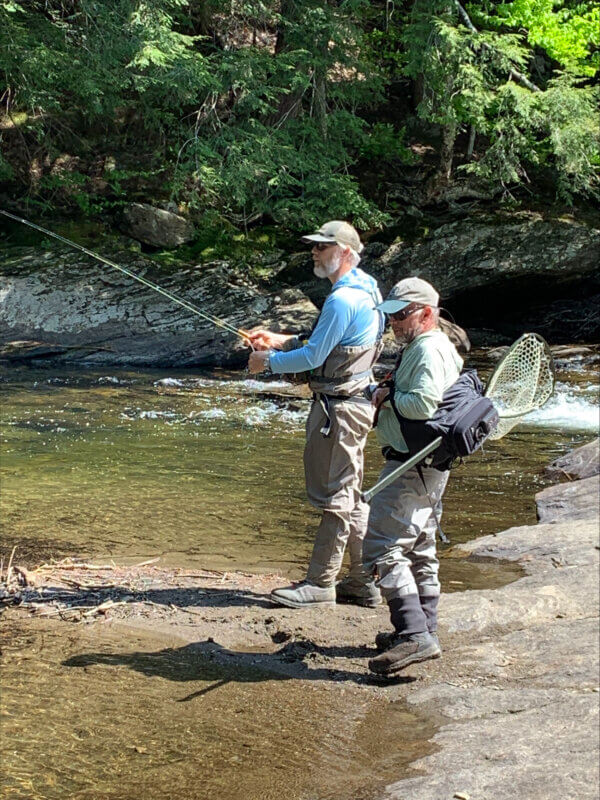Sometimes a master guide teaches more than fishing
The summer, thus far, has been mercurial at best. We started out with our beloved lake pushing 99 feet above sea level.
(FYI: I’m a total nerd when it comes to tracking our lake levels due to recent history of swamps getting so low that we can’t even get a canoe into our duck blind in October.)
With a couple days of 100-degree heat index points in May, I thought that our aqueous jewel might look more like Bonneville Flats by August. Foraging season happened in the blink of an eye. Fiddleheads and ramps popped in early May and wild asparagus were stalked out before the end of the month.
The rivers were running very warm. Our regular spot on the Winooski ran at an absurd 70 degrees even before the Fish & Wildlife Department had finished stocking the rainbows, browns and brookies. Fly hatches were so minuscule that only the most knowledgeable guides were able to read what was happening when someone spotted a rise. That’s why, even though I have 54 years of experience flyfishing, I recognize when I need to spend time with a truly professional, full-time, off-the-charts Master Guide.
Recently I invited a new friend along for a day on the North Branch of the Lamoille with my revered flyfishing wizard, Mark Wilde, of Uncle Jammer’s Guide Service. I wanted my new friend, Steve Shaw, to experience what it was like to learn from an incredibly gracious and gifted fisherman.

A fishing guide and support test the waters.
Mark took us to one of those postcard-picture scenes with a deep pool under a wooden bridge and, rather than compete for some rising brown trout at the upper edge of a riffle, I chose to watch. The oxygen was clearly a lifesaver for these fish, as was the water temperature — a perfect 58 degrees.
Mark directed Steve where to place his parachute Adams fly mid-riffle. Steve cast several times without a taker.
Mark stepped up next to him and asked if he’d like any guidance. Like any truly gracious fly fisherman, Mark does not generally solicit coaching unless asked. Steve accepted the offer.
Mark stepped up to the hole, spontaneously calculating the speed of the main current inside the riffle track and demonstrated a cast I had not seen before. Most accomplished fly fishermen and women know the importance of mending a line to keep the fly floating at the same speed as the current where the fish lie in wait. But this one was new to me. As Mark let the line run from his forward cast through the smooth eyelets of the well-loaded rod, it gained speed that the weight forward line needed to reach across the slower current closer to shore.
Nanoseconds before his fly began to settle, he twitched the perfectly weighted flyrod, making the floating line “wiggle” like crazy. I watched in amazement. What was this? A bizarre version of mending?
Within two seconds a beautiful buttery brown trout slammed that Adams. Steve and I looked on in amazement. I broke the silence and asked the singular stupid question of the day. (I allow myself one stupid question a day when fishing with those who are more accomplished than myself.) I blurted out: “What the heck was that? And why did it work so well?”
Mark explained the dynamics of providing enough slack in the slower current that the “wiggly” section of line absorbed the slower speed, allowing the fly to travel at the exact same speed as a naturally occurring hatch would.
Anyone who claims that flyfishing is “boring” is clearly not paying attention to all the details, which I proclaim are one of the billions of miracles that occur around us — every day, every hour, every minute, down to the millisecond.
If the parachute Adams, size 14, didn’t match the size of the real hatch, if the color of the wings or the thorax didn’t match the natural, if the speed of the fly in the current wasn’t perfectly matched with the surrounding water, if the sun was in front of the feeding fish and cast a shadow of your body on the pool. If, if, if.
If you’ve ever wondered what makes fly fishermen so passionate, consider the details. How did Tiger Woods get to the level of mastery of his game? How did LeBron James get to the top of his game? I would propose to you, my dear reader, that the passion for perfection comes from a deep abiding love that exists in all living souls. A connection to the divine nature of all that surrounds us.
I didn’t catch any fish that day, but instead, perched on a high slab of rock, I watched a master gently guide my friend to a new level of consciousness. Within minutes, Steve was landing and releasing several well-toned browns.
I think I saw him whispering the words “thank you” to himself.
(Bradley Carleton is executive director of Sacred Hunter, a privately owned limited liability corporation that seeks to educate the public on the spiritual connection of man to nature through hunting, fishing and foraging.)

